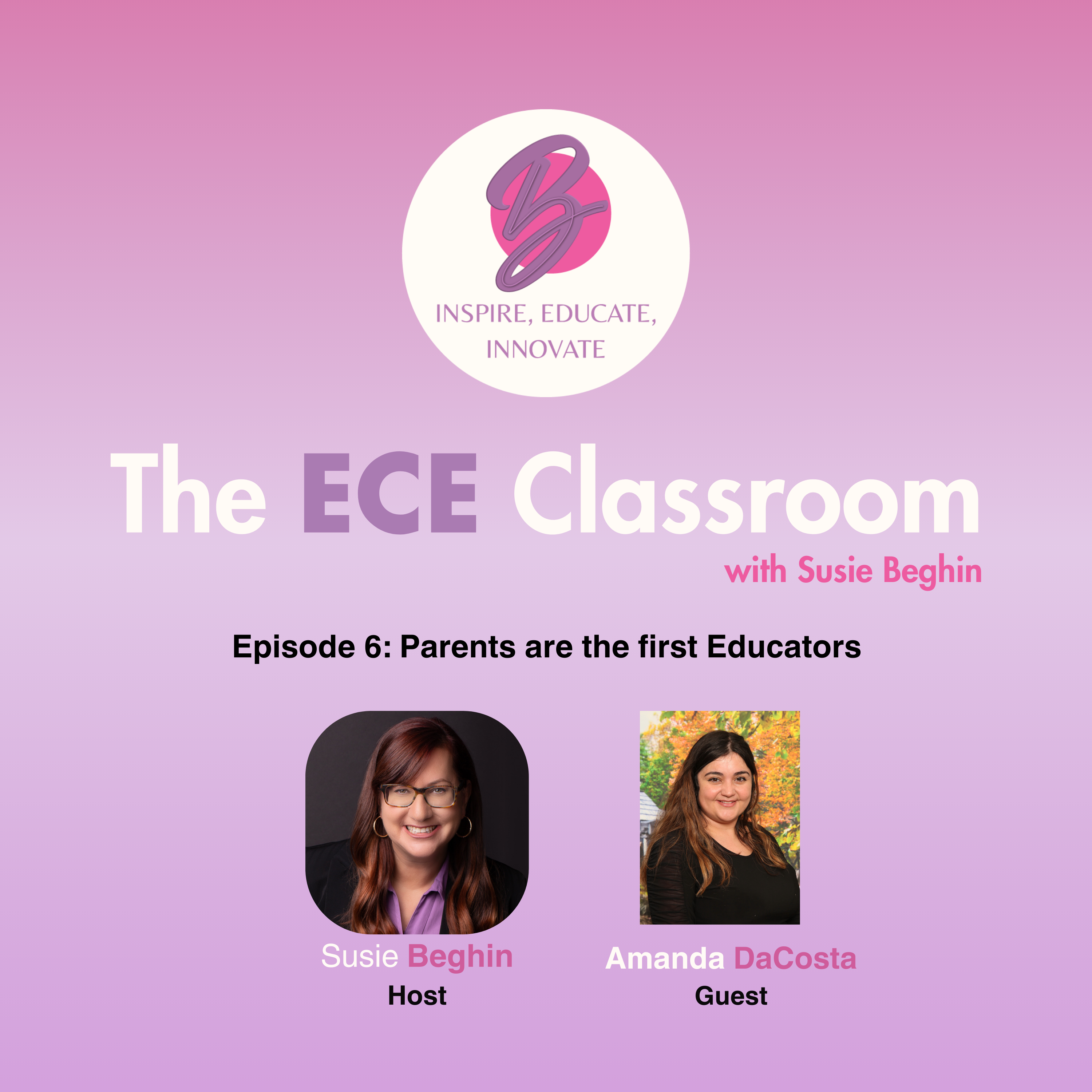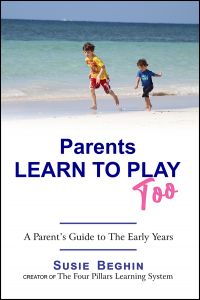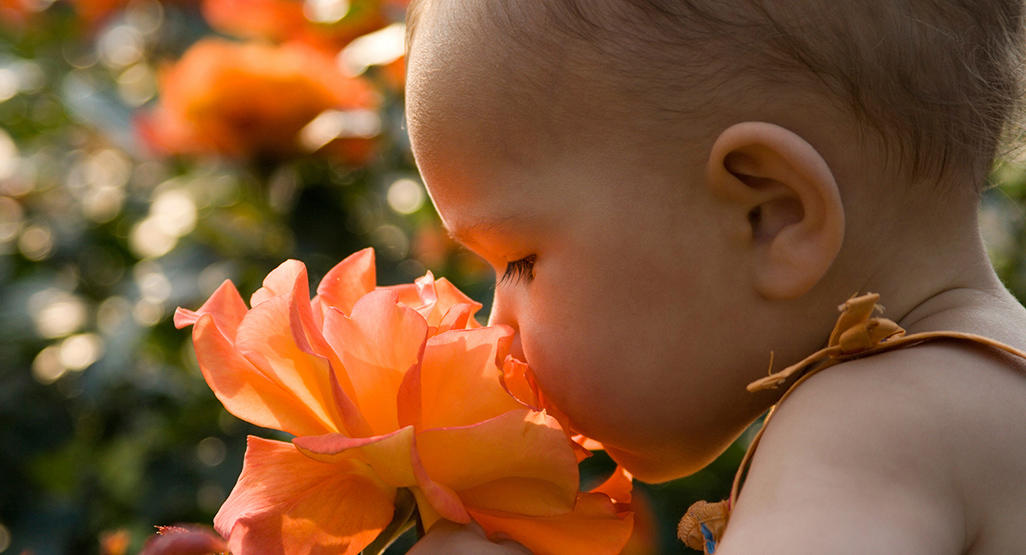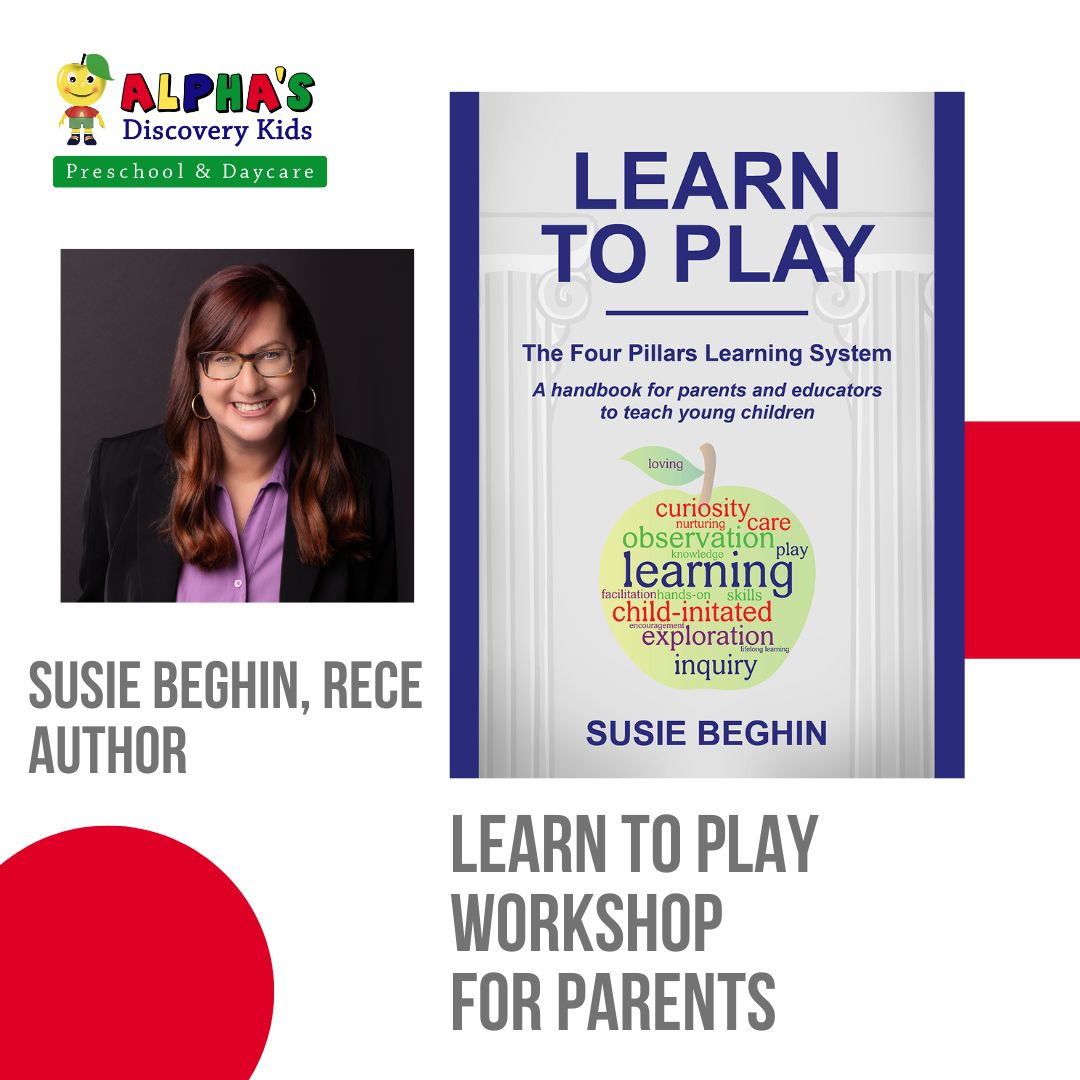Parents are The First Educators
Parents are The First Educators
by Susie Beghin, RECE, Founder of Alpha’s Discovery Kids
In the latest episode of my podcast, The ECE Classroom, I had the pleasure of interviewing Amanda DaCosta, a supervisor at Alpha’s Discovery Kids Preschool and Daycare. Our conversation was all about the importance of play in early childhood education and how parents can get involved to support their children’s learning and development. The insights Amanda shared are valuable for both educators and parents.
The Importance of Play
Play is not just a fun activity for children; it is a fundamental aspect of their learning and development. Research consistently shows that children learn best through play and in our discussion, Amanda emphasized that play is the best way to engage children in academics and other developmental milestones. It allows children to explore, create, and learn at their own pace. By understanding the significance of play, parents can better support their children’s growth and learning experiences.

Parents as the First Educators
One of the key themes of our conversation was the recognition of parents as the first and best educators for their children. Amanda passionately stated, “Parents are the first, I think the best educator because they know the child best.” This perspective highlights the critical role parents play in shaping their child’s educational journey.
Parents often underestimate their influence on their child’s education. By being actively involved in their child’s play, parents can help reinforce concepts learned in preschool or daycare. For example, if a child is learning about colors, parents can incorporate color games during playtime at home. This not only solidifies the child’s learning but also strengthens the bond between parent and child.
Utilizing Everyday Household Items
Amanda shared practical tips on how parents can use everyday household items for play and learning. She encouraged parents to look around their homes for resources that can stimulate creativity and exploration. Simple items like cardboard boxes, kitchen utensils, and art supplies can become powerful tools for imaginative play. This approach not only makes learning accessible but also reinforces the idea that education can happen anywhere, not just in a classroom setting.
The Four Pillars of Learning
We also discussed the “four pillars of learning” that we believe are essential for child development:
- Language and Literacy: Encouraging reading and storytelling to enhance language skills. This can include reading aloud, discussing stories, and even creating their own stories together.
- STEAM: Integrating science, technology, engineering, arts, and mathematics into play to foster critical thinking. Simple experiments, building projects, and artistic activities can spark a child’s interest in these areas.
- Physical Activity and Nutrition: Promoting healthy habits through active play and nutritious meals. Physical activity is crucial for developing motor skills and overall health, while nutrition plays a key role in cognitive development.
- Mindful Awareness: Teaching children to be present and aware of their feelings and surroundings. Mindfulness activities can help children manage their emotions and develop a sense of empathy towards others.
These pillars serve as a framework for parents and educators to create enriching experiences that support holistic development. By focusing on these areas, parents can ensure that they are nurturing well-rounded individuals who are prepared for future challenges.
The Importance of Communication
Another vital aspect we explored was the importance of communication between educators and parents. Amanda stressed that effective communication is crucial in demonstrating the value of play-based learning. By sharing insights, resources, and strategies, educators can empower parents to engage in their children’s learning journeys. Regular updates and workshops can help parents understand the significance of play in their child’s development, fostering a collaborative approach to education.
“Parents Learn to Play Too” Book
We also spoke about my book being released on Sept 15th, Parents Learn to Play Too, which serves as a guide for parents looking to incorporate play into their daily routines. This resource offers a variety of activities and tips that can easily be integrated into family life, making it an invaluable tool for fostering learning through play.
Favorite Activities for Parents and Children
As we wrapped up the episode, I reflected on just how much play impacts early childhood education. Amanda and I agreed that empathy, communication, and creativity are key to fostering a love of learning. Our conversation left me feeling inspired and excited to share these insights with listeners. It’s a powerful reminder of the critical role parents play in their child’s education, and how play is the foundation for learning.
Stay tuned for more insightful discussions on early childhood education, parenting, and educator empowerment. Let’s continue to learn, grow, and make a difference in the lives of our students every day.
You can listen to the podcast on your favorite podcast platform, or by clicking here: https://open.spotify.com/show/7Hg7rTtRQggsVSCbbOdvP2?si=paCEPiCRRGK7yOfrTTsh8Q
Mindful Parenting: Promoting Calmness, Patience, and Connection with Your Children
Mindful Parenting: Promoting Calmness, Patience, and Connection with Your Children
by Susie Beghin, RECE, Founder of Alpha’s Discovery Kids
Have you ever spent hours scouring the internet for parenting tips, seeking solutions to the daily challenges and uncertainties you face? Parenting can often feel like an overwhelming task filled with constant demands and pressures. As a mother and an Early Childhood Education (ECE) educator, I empathize with these pressures firsthand. That’s why I believe mindfulness is so crucial, not only for children but also for us adults. From my conversations with many parents, I know that mindful parenting, which integrates calmness, patience, and a deep connection with our children, is of utmost importance.
Mindful parenting involves being fully present and engaged with your children, fostering a deep sense of awareness and connection. It’s about slowing down, appreciating the moment, and responding to your child’s needs with empathy and understanding. Mindfulness in parenting helps create a supportive environment where children feel valued, heard, and loved. This approach not only benefits the children but also promotes the well-being of parents, reducing stress and enhancing the overall family dynamic.
In this blog, I’ll share some tips that I hope you find helpful in incorporating mindful parenting into your daily life. These tips are designed to help you nurture calmness, patience, and a stronger connection with your children, fostering a positive and supportive family environment.

Tips to Promote Calmness
- Practice Self-Care: Before you can be present for your children, it’s crucial to take care of yourself. Ensure you are getting enough rest, eating well, and engaging in activities that rejuvenate you. Self-care isn’t selfish; it’s necessary for maintaining your well-being and being the best parent you can be.
- Breathing Exercises: Simple breathing exercises can help both you and your children manage stress and stay calm. Practice deep breathing techniques together, especially during moments of tension. Inhale deeply through the nose, hold for a few seconds, and exhale slowly through the mouth.
- Create a Calm Environment: Your home environment significantly affects your family’s mood and behavior. Keep your living space organized and clutter-free to create a sense of tranquility. Soft lighting, calming music, and incorporating natural elements can also contribute to a peaceful atmosphere.
Tips to Promote Patience
- Practice Mindfulness Meditation: Regular mindfulness meditation can help you develop greater patience. It trains your mind to stay focused on the present moment and reduces impulsive reactions. Even a few minutes of meditation each day can make a significant difference.
- Empathize with Your Child: When your child is acting out, try to see the situation from their perspective. Understanding their feelings and frustrations can help you respond with empathy rather than impatience. Remember, children are still learning how to navigate their emotions and the world around them.
- Set Realistic Expectations: Recognize that children are still developing their skills and may not always meet your expectations. Adjusting your expectations to their developmental level can reduce frustration and help you respond more patiently.
Tips to Promote Connection
- Engage in Shared Activities: Spend quality time with your children doing activities they enjoy. This could be reading together, playing games, or simply talking. Shared activities foster a strong bond and show your children that you value spending time with them.
- Listen Actively: Active listening involves giving your full attention to your child when they speak. Make eye contact, nod, and respond appropriately to show that you are engaged in the conversation. This practice helps your child feel heard and understood.
- Express Love and Appreciation: Regularly express your love and appreciation for your children. Positive affirmations, hugs, and kind words go a long way in building a strong emotional connection. Let your children know that they are loved unconditionally.
Mindful parenting is a journey that requires practice and patience, but the rewards are profound. By incorporating mindfulness into your parenting approach, you can promote calmness, patience, and a deep connection with your children. Remember to take care of yourself, practice empathy, and engage in meaningful activities with your children. These practices will help create a supportive and loving environment where your children can thrive.
For more insights and practical tips on fostering your child’s development through play and mindfulness, I invite you to explore my book, Learn to Play. It’s a comprehensive guide designed to help parents and educators provide the best start in life for their children.
By adopting these mindful practices, we can transform our parenting approach, ensuring that we raise happy, healthy, and well-rounded children.
Parenting in the Digital Age: Screen Time
Parenting in the Digital Age: Screen Time
by Susie Beghin, RECE, Founder of Alpha’s Discovery Kids
Parenting in the digital age can feel like navigating uncharted territory. As a parent and the owner of Alpha’s Discovery Kids, I am acutely aware of the complexities involved in raising children in an era dominated by technology. In our rapidly evolving world, where digital devices are part of our everyday lives, finding the right balance between harnessing the benefits of technology and safeguarding against its potential drawbacks is crucial. At Alpha’s Discovery Kids, we prioritize creating an environment where children can thrive emotionally, socially, and intellectually while also recognizing the role that technology plays in their lives. Striking this balance is essential as we help guide children through their formative years.
One of the most pressing concerns for parents is managing screen time limits. With smartphones, tablets, and other digital devices becoming increasingly prevalent, children are spending more time than ever in front of screens. This is why it’s so important to focus on creating a balance between embracing technology for educational purposes and ensuring children have ample opportunities for real-world experiences and interactions. After all, children learn best through play so we want to make sure we are encouraging them to participate in activities such as outdoor play, social interactions and creativity.

Quality of content is another major consideration for parents navigating the digital landscape. With countless apps, games, and digital platforms available to children, it’s essential to curate content that is not only entertaining but also enriching, age-appropriate, and safe. Parents must discern between educational content that fosters learning and critical thinking skills and potentially harmful or addictive material. It’s equally important to make sure that the digital content aligns with family values and educational goals – just one more layer of complexity to the decision-making process!
The impact of technology on children’s social and physical development also cannot be overlooked. Excessive screen time has been linked to a sedentary lifestyle, which can contribute to a decline in physical activity and overall well-being. Additionally, prolonged use of digital devices can sometimes replace face-to-face interactions, affecting children’s social skills and emotional development.
Despite these challenges, we believe that technology can be a valuable tool when used appropriately. At Alpha’s Discovery Kids, we incorporate technology into our curriculum in a way that enhances learning experiences and fosters creativity, striving to provide children with opportunities to engage with technology in meaningful ways.
We also encourage open communication about technology. By discussing the benefits and potential drawbacks of technology with children, parents can help them develop healthy digital habits and make informed choices about their screen usage.
Ultimately, parenting in the digital age requires a thoughtful and proactive approach. By creating a balance between technology and real-world experiences, setting clear guidelines for screen time, and fostering open communication, parents can help their children navigate the digital world safely and confidently. At Alpha’s Discovery Kids, we are committed to supporting parents in this journey and providing children with the tools they need to thrive in today’s digital age.
For more information on early childhood topics, follow Susie Beghin’s YouTube channel where she delves deeper into these topics.
Announcing my new YouTube Channel
Announcing my new YouTube Channel – @Susie-Alphas
by Susie Beghin, RECE, Founder of Alpha’s Discovery Kids
As an educator and a mother of two wonderful kids, I understand the challenges and joys of parenting firsthand. Over the years, I have encountered numerous questions from parents seeking guidance on a wide range of topics related to early childhood. Whether it’s dealing with a toddler’s constant “no,” managing separation anxiety or finding the right daycare, I have heard it all.
And my experience ultimately led me to write my book, ‘Learn To Play,’ where I used the knowledge I have gained as an ECE educator and mother to create our unique curriculum, The Four Pillars of Learning. My goal is to share this teaching method with parents and educators as a tool for learning at home and in the child care setting.
And now, I am adding a new way of sharing information with parents. I am thrilled to announce the launch of my new YouTube channel, @Susie-Alphas. I created this platform to address your burning questions and concerns about early childhood and to provide a go-to resource for reliable information. My hope for this endeavor is to help parents navigate the early years, and that’s precisely what I aim to do with this channel.
The information on early childhood is scattered across the internet, making it challenging for parents to find comprehensive and reliable answers to their specific questions. In launching this YouTube channel, I aim to create a focal point where parents can turn to for valuable insights and practical advice on various aspects of early childhood.
One of the driving forces behind @Susie-Alphas is to provide real answers to real questions from real parents. I encourage you to send in your questions, and each week, I will address a new question in a video. Your questions are what make this channel truly valuable, as they reflect the concerns and interests of parents just like you. If a question or concern arises frequently, you can expect a video on that topic because if it’s essential to you, it’s essential to me as well.
As you explore the @Susie-Alphas YouTube channel, you’ll also find links to my book, ‘Learn To Play,‘ which serves as a comprehensive guide for parents and caregivers. It delves deeper into various aspects of early childhood, providing you with more in-depth knowledge and understanding.
My aim is to inform, support, and empower parents on their journey through the early years. Some of the topics I plan to cover include mom guilt, building confidence in your child’s environment, managing toddler behaviour, handling separation anxiety, finding the right daycare, addressing biting behaviour, navigating potty training and nutrition.
However, the journey doesn’t end here. I want to hear from you! What else do you want to know about early childhood? Let me know your burning questions, and I’ll make sure to address them in upcoming videos.
I firmly believe that the @Susie-Alphas YouTube channel will allow parents to come together in this virtual space, creating a supportive community where we share similar experiences, challenges, and triumphs.
Don’t forget to subscribe to @Susie-Alphas on YouTube and hit the notification bell so you never miss a video. Together, let’s navigate the early years and create a strong and supportive community of parents who are ready to embrace the joys and challenges of parenting.
For more information on our 4 Pillars of Learning, or to book a tour, please contact us at https://www.alphasdiscoveryclub.com/contact/ or call us at 905-823-8257.
5 Ways to Tap into Your Inner Child
5 Ways to Tap into Your Inner Child
by Susie Beghin, RECE, Founder of Alpha’s Discovery Kids
As an educator, parent, and daycare owner, I feel blessed to be around children every day. Being with children has allowed me to learn how to tap into my own inner child. I have seen firsthand how important it is to my relationship with them. Children tend to engage with me and seek me out when I’m connected to my inner child.
What is the Inner Child?
The Inner Child lives inside you. It can best be described as “child-like”, innocent and free from worry. It can’t be taken away, but it can hide. It’s like a light shining within you that can’t burn out, but it can be temporarily dimmed.
Why tap into your Inner Child?
There are a couple of important reasons to tap into your inner child. One of the main reasons you will want to do this is to feel more joy and energy in your life. Have you ever noticed that children seem to be full of joy most of the time? They tend to smile and laugh more than adults. They are full of energy! The second reason is, as a parent, it will strengthen your relationship with your children. In the book Learn To Play, I state the importance of tapping into your inner child when you are playing with them. It will allow you to influence and educate them in the best way possible. And finally, it’s good for your mental health. When you tap into your inner child, it feels good!
5 Ways to Tap into Your Inner Child
- Spend Time with Children in Play – I found this way to be the easiest. Children naturally will bring out your inner child when you are playing with them. Resist the urge to direct the play. Just follow along with what they are doing. The more you follow, the more your inner child will come out. Let yourself be free in the play. Don’t worry about anything – like making a mess. Don’t be afraid to get silly and don’t worry about what anyone else thinks. Be playful and have fun.
- Be Curious – We can learn how to be curious by observing children. They naturally have a sense of wonder and curiosity about everything. They are learning about their world and there are many new things to learn. A baby is just figuring out how to open and close a kitchen cupboard. Imagine their excitement when they finally get it open! They want to do it repeatedly! Children are like scientists that are always testing a hypothesis. They are curious about how things work. We need to see the world in the same way. We need to be curious and look at the world with the eyes of a child.
- Be Mindful – Being mindful means focusing on the present moment without any judgement. Children are naturally mindful and have a heightened sense of awareness. They tend not to worry about the past or future and are mostly focused on what is happening in the present moment. We can learn a lot from children in this regard. Many of our worries and problems arise when we are too focused on the past or the future. We forget to enjoy the present moment, which is full of opportunities and joy. Want to learn how to be mindful? Click here and watch one of our videos about how to cultivate mindfulness.
- Look up – We live in a world with a lot of distractions and mobile phones have had a huge impact on us. I am guilty of spending too much time looking at my phone and scrolling through social media instead of enjoying the scenery on a drive. I have sat at the dinner table answering a message on my phone instead of engaging in conversation with the people sitting beside me. These same phones that are supposed to connect us to the world, often tend to disconnect us – emotionally. When we look up from our phones, we notice the world around us in a new way. We can’t engage with that world if we are looking down. Our inner child needs us to look up.
- Do something new – One of the best ways to challenge yourself to tap into your inner child is to try something new. Learn a new language, visit a new destination, or try out a new craft. Whatever you do, make sure you haven’t done it before. This will challenge your brain to make new connections the same way a child does when they learn something new.
Once you learn to tap into your inner child, you will be well equipped to engage with you kids and build the relationship. The spark is within you, you just need to let it shine!
Learn to Play Workshops: For Parents
Learn to Play Workshops: For Parents
Susie Beghin wants to give children the best start in life. It’s why she founded Alpha’s Discovery Kids in 2012, a daycare and preschool dedicated to providing quality education and a positive learning environment.
Now, Susie shares the foundation of Alpha’s Discovery Kids’ beloved and celebrated inquiry-based curriculum in her new book, Learn to Play: The Four Pillars Learning System.
Learn to Play: The Four Pillars Learning System, is a must-read for all parent-to-be or parents with young children! In the book, Susie shares her teaching method with parents and educators as a tool for learning both at home and in the childcare setting. For each pillar of learning, there are strategies on how to build skills as well as sample free-play and intentional play activities – by age group, from infants to preschoolers.
Susie is now offering workshops to teach the fundamental concepts in the book for parents who want to learn how to teach their kids through play. She is inviting parents to participate in the free workshop to explore the book in a hands-on learning environment. Note: parents must purchase the book to enroll in the free workshop.
The workshops will be held monthly at the following location:
Alpha’s Discovery Kids – Mississauga
6435 Erin Mills Parkway E-02 Mississauga, ON L5N 4H4
Tickets available on EventBrite. Click here to book tickets.
Sleep Tips for Young Children: How to get a good night’s rest
Sleep Tips for Young Children: How to get a good night’s rest
Some say “never wake a sleeping baby” but what if the baby won’t sleep at all? What if they sleep too much? Knowing how much sleep your child needs can be confusing because it seems everyone has an opinion on the topic and there is so much information to sift through about sleep tips.
Keep in mind that what works for some may not work for all. While some of you may be simply exhausted because your child doesn’t sleep enough, other parents may be experiencing worry about children who sleep too much. Some children will naturally fall below the recommended or typical sleep amounts for their age group and can function well on less sleep. Some children may need extra sleep, but it’s something to monitor because that means less awake time to learn and play. You’ll want to check with your pediatrician if your child’s sleep needs are excessively high or low.
If these topics are keeping you up at night and your child too, you are not alone. Sleep is a big topic among parents and it’s important to remember to stick to the facts. Always use reputable sources of information online, books or consult with your doctor rather then using the advice in a mommy’s group, from a friend or family member. Although the latter may be a trusted source, it’s best to check on that advice with a professional to make sure it is sound.
How Much Sleep Do Children Need?
This chart is a general guide to the amount of sleep children need over a 24-hour period, including nighttime sleep and daytime naps.
| Infants (4 to 12 months old) | 12-16 hours |
| Toddlers (1 to 2 years old) | 11-14 hours |
| Children (3 to 5 years old) | 10-13 hours |
| Children (6-12 years) | 9-12 hours |
| Teenagers (13-18 years old) | 8-10 hours |
Here’s some handy sleep tips that may help your child (and you) get the sleep you need:
-
Establish a regular sleep pattern
Establishing a regular sleep pattern is important. It will help your child understand when it is time to sleep. Also, your child will have better sleep. Bedtime shouldn’t vary by more than an hour across all days of the week (even weekends) – whether your child has an early start the next morning or not. The same goes for waking time.
-
A consistent bedtime routine
It is good to have the same routine before bed each night. This will help prepare for sleep. Quiet activities are good, such as reading a book or having a bath or shower. In the half hour before bed, there are some things you want to avoid such as active games, playing outside, TV, internet or mobile phone games. These activities will stimulate the child and make it difficult to fall asleep.
-
Make sure the bedroom is comfortable
The bedroom should be quiet, comfortable, and dark. Some children like a night light. This is fine. Make sure your child sees the bedroom as a good place to be.
-
Bed is for sleeping, not entertainment
Devices and games will distract your child and are not good for their sleep. Keep them out of the bedroom. “Needing” to watch a screen to fall asleep is a bad habit. This can easily develop, but you don’t want it to happen.
-
Some foods can disturb sleep
A high intake of sugary or fatty foods has been linked with more restless sleep. Avoid sugary or high fat snacks before bedtime, as well as large meals. A small healthy savoury snack, one hour before bedtime, would be fine.
-
Take care with daytime naps
It is normal for young children to nap during the day. As your child gets older, they will need less sleep. This means they will need to nap less. The number and length of naps depends on your child. If your child is not going to sleep at a reasonable time at night, it may be time to shorten or stop daytime napping.
-
Exercise and time outside
Daily exercise is an important part of healthy living. It also promotes good sleep. Time spent in bright daylight does the same. Outdoor exercise achieves both these things. It’s best for young children to go outside for at least 2 hours throughout the day to get the physical activity they need. However, it is best to steer clear of vigorous activity in the hour before sleep.
-
Work with your doctor
If your child is sick or isn’t comfortable, their sleep will suffer. Some children suffer from specific sleep problems such as frequent nightmares, snoring or sleep apnoea. It is important that these problems are dealt with. If you think ill health is involved, discuss this with your family doctor.
-
Specific sleep-related issues in children
The Sleep Health Foundation has a range of helpful fact sheets for children with sleep issues. These include tips on sleep issues for children with ADHD (see ADHD and Sleep in Children) or autism (see Autism in Children and Sleep), as well as more general topics such as bedwetting (see Bedwetting), childhood snoring (see Childhood Snoring and Sleep Apnea) and behavioural problems with settling to sleep (see Behavioural Sleep Problems in School Aged Children).
Sleep is important, not only for your child’s well-being, but yours too! For more information about how we promote children’s well being, check out our programs!
6 ways to raise compassionate kids
6 ways to raise your children to be giving, caring and compassionate kids
How do you teach your child to be compassionate? This may sound like a difficult task, especially when you may have a hard time even getting them to share. Here are a few ways to you can begin to instill this positive character trait.
1. RECOGNIZE AND AKNOWLEDGE GOOD ACTS
Positive reinforcement works well with kids. Encourage your child’s efforts to give back or share with others. If you see your kids being generous even in the smallest way, praise them and acknowledge the gesture.

2. LEAD BY EXAMPLE
Kids are visual learners, and the best way to teach them about giving back is by modeling that behavior yourself. You have to give to teach your kids to give.
3. BEING A GIVING FAMILY
Along with setting a good example for your children, have conversations about giving. Be mater of fact about it. Use phrases like “We give to others because we can.” Explain to them why you’re giving time or money to a particular cause and explain why. Actions speak louder then words and there’s no better way to teach kids about giving back than through action.

4. MINDFUL MONEY CHOICES
Teaching your children about setting aside money to give to important causes is the key to raising socially conscious kids. This is also a great well to instill self-regulation and prevent impulsiveness. Along with talking to them about money, teach your children about the value of using a portion of their money to give back to the community and donating to charity.
5. KINDNESS AND TIME ARE EQUIVILANT TO MATERIAL THINGS
Many of us are not able to donate money to charity but that doesn’t mean we can not still teach and instill generosity.
Teach your children the value of giving their time and energy to others. The value of kindness and even the generosity of a smile, opening a door or helping someone pick up something they have dropped holds so much value. Teach your children not to hesitate to jump in and help someone in need.

6. BE A SAFE PHILANTHROPOIST
It’s always important to teach children safe perimeters with respect to giving. There are always reasonable safety concerns to consider when giving whether it be money, time, gestures, material items or food.
A few safety tips to consider sharing based on your child’s age or development
The STOP, THINK, ASK policy is a good one to instill in your children of any age because as we know even kind-hearted adults can be but at risk if they are not careful. Here’s some safety considerations:
• Sharing food can be dangerous because some people have allergies (ask an adult first)
• Smiling at a stranger or saying hello is safe but ask an adult before talking to or helping a stranger
• Ask an adult to help you choose a charity before giving money or valuables.
These tips will go a long way to raising compassionate kids.
For more information about how we foster compassion through our curriculum, click here.









